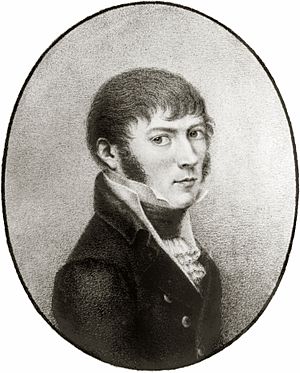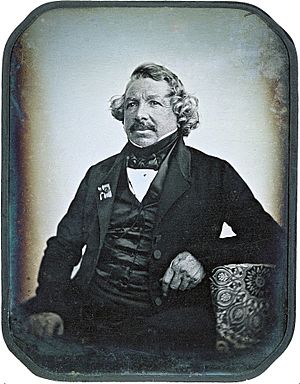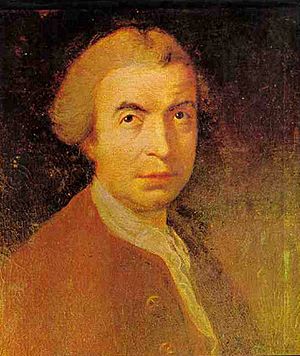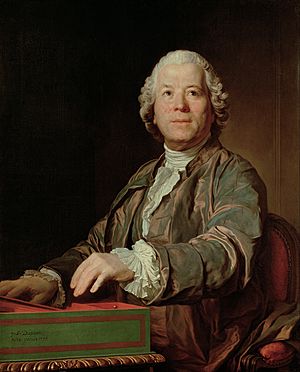The year 1787 was a time of big changes, especially in the United States, where a new plan for the country's government was created. Many other important events happened around the world, from scientific discoveries to new alliances and the start of new countries.
This article is about the year 1787.
1787 (MDCCLXXXVII) was a common year starting on Monday of the Gregorian calendar and a common year starting on Friday of the Julian calendar, the 1787th year of the Common Era (CE) and Anno Domini (AD) designations, the 787th year of the 2nd millennium, the 87th year of the 18th century, and the 8th year of the 1780s decade. As of the start of 1787, the Gregorian calendar was 11 days ahead of the Julian calendar, which remained in localized use until 1923.
Key Events of 1787
January to March: New Beginnings
- January 9 – In North Carolina, leaders decided to buy land for a new town. They named it Pittsborough, which is now Pittsboro.
- January 11 – The famous astronomer William Herschel discovered two new moons orbiting the planet Uranus. He named them Titania and Oberon.
- January 19 – Mozart's Symphony No. 38 was performed for the first time in Prague.
- February 4 – A rebellion in Massachusetts, called Shays' Rebellion, came to an end.
- February 21 – The government of the United States, under the Articles of Confederation, announced that a meeting would be held in Philadelphia. The goal was to improve the Articles of Confederation.
- February 28 – A special paper was signed to create a new school, which later became the University of Pittsburgh.
- March 3 – Harrisburg was chosen as the new capital city of Pennsylvania.
- March 17 – The Bank of North America, which was like the central bank for the U.S. government, was started again after its original permission had run out.
- March 30 – Biblical theology, a way of studying the Bible, became its own special subject in Germany.
April to June: Important Meetings and Journeys
July to September: A New Nation Takes Shape
- July 13 – The government passed the Northwest Ordinance. This law set up rules for governing the Northwest Territory (which later became states like Ohio and Michigan). It also explained how new states could join the country and limited the spread of slavery.
- July 18 – The United States signed its first agreement with the Sultanate of Morocco.
- August 9 – South Carolina gave up its claim to a strip of land in what is now Alabama and Mississippi to the United States.
- August 10 – Wolfgang Amadeus Mozart composed his famous piece of music, Eine kleine Nachtmusik.
- August 27 – John Fitch showed off his steam-powered boat on the Delaware River. He received the first U.S. patent for his design.
- September 13 – Troops from Prussia invaded the Dutch Republic. Many Dutch patriots had to leave their homes and go to France.
- September 17 – The United States Constitution was signed by the delegates at the Constitutional Convention in Philadelphia. This was a huge step in creating the United States as we know it.
- September 24 – Washington Academy, which later became Washington & Jefferson College, was officially started in Pennsylvania.
October to December: More States and Discoveries
- October 1 – In the Russo-Turkish War (1787–92), Russian forces won a battle against the Turks.
- October 27 – The first of The Federalist Papers was published. These were a series of essays written to convince people to approve the new U.S. Constitution.
- October 29 – Wolfgang Amadeus Mozart's opera Don Giovanni was performed for the first time in Prague.
- November 1 – The first secondary school for girls in Sweden, called Societetsskolan, was opened.
- November 21 – An agreement was signed between France and Lord Gia Long, who would later become the Emperor of Vietnam.
- December 3 – James Rumsey showed off his boat that moved using a water jet on the Potomac River.
- December 7 – Delaware became the first state to approve the new Constitution, officially joining the United States.
- December 8 – The La Purisima Mission was founded in California.
- December 12 – Pennsylvania became the second state to approve the Constitution.
- December 18 – New Jersey became the third state to approve the Constitution.
- December 23 – Captain William Bligh set sail from England on the ship HMS Bounty, heading for Tahiti.
Other Important Events of 1787
- Caroline Herschel was given a yearly salary by King George III of Great Britain for helping her brother William with his astronomy work.
- The town of Waynesborough was started in North Carolina, but it no longer exists today.
- Antoine Lavoisier suggested that silica was made of a metal that hadn't been discovered yet. This metal was later named silicon.
- The first serious school for girls in Denmark was founded.
- A fossil bone found in New Jersey was discussed by a scientific group in Philadelphia.
Famous People Born in 1787
- January 1 – Manuel José Arce, a general and the first President of the Federal Republic of Central America.
- February 10 – William Bradley, known as Britain's tallest man.
- February 23 – Emma Willard, an important American educator.
- March 6 – Joseph von Fraunhofer, a German expert in optics (lenses and light).
- March 9 – Josephine Kablick, a Czech botanist and paleontologist.
- April 26 – Ludwig Uhland, a German poet.
- May 25 – José María Bocanegra, who became the 3rd President of Mexico.
- June 28 – Sir Harry Smith, an English soldier and military leader.
- August 24 – James Weddell, a British sailor who discovered the Weddell Sea.
- October 4 – François Guizot, who became Prime Minister of France.
- November 4 – Edmund Kean, a famous English actor.
Births with Unknown Dates
Notable People Who Passed Away in 1787
- January 1 – Arthur Middleton, an American politician.
- February 4 – Pompeo Batoni, an Italian painter.
- February 13 – Rudjer Boscovich, a Croatian scientist and diplomat.
- February 13 – Charles Gravier, comte de Vergennes, a French statesman.
- March 8 – Samuel Graves, a British Royal Navy admiral.
- April 2 – Thomas Gage, a British general.
- May 28 – Leopold Mozart, an Austrian composer and father of Wolfgang Amadeus Mozart.
- June 20 – Carl Friedrich Abel, a German composer.
- July 4 – Charles, Prince of Soubise, a Marshal of France.
- August 1 – Alphonsus Liguori, an Italian saint.
- October 7 – Henry Muhlenberg, who founded the U.S. Lutheran Church.
See also
 In Spanish: 1787 para niños
In Spanish: 1787 para niños
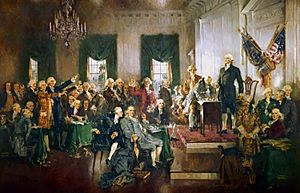
 In Spanish: 1787 para niños
In Spanish: 1787 para niños





